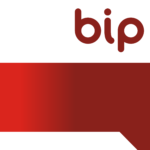Large Animal Models Laboratory
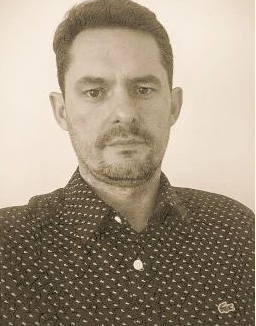
Laboratory Manager
PhD, DSc Jarosław Woliński, institute professor
🖂 j.wolinski@ifzz.pl ✆+48 666 055 013
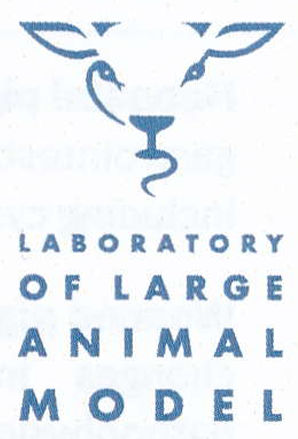
Researchers
PhD, Dsc Jarosław Woliński, institute professor
DVM Dominika Szkopek, 🖂 d.szkopek@ifzz.pl
Veterinarians
DVM Katarzyna Roszkowicz-Ostrowska, 🖂 k.roszkowicz@ifzz.pl
DVM Aleksandra Sikora, 🖂 a.sikora@ifzz.pl
DVM Dominika Szkopek, 🖂 d.szkopek@ifzz.pl
tech. vet. Marta Nałęcz
tech. vet. Izabela Wesołowska
Veterinary Center Manager
DVM Dominika Szkopek, 🖂 d.szkopek@ifzz.pl
Pig Center Manager
DVM Katarzyna Roszkowicz-Ostrowska, 🖂 k.roszkowicz@ifzz.pl
Ruminant Center Manager
PhD Małgorzata Majewska, 🖂 m.majewska@ifzz.pl
External Audit
DVM Łukasz Paczewski, 🖂 l.paczewski@ifzz.pl
Animal Handling Workers
Jolanta Burza
Rafał Druchniak
Golba Katarzyna
Sławomir Goliszewski
Wiesław Mrozek
Yevhen Smirnov
Andrzej Wodzyński
Artur Zaliwski
Laboratory rooms and equipment
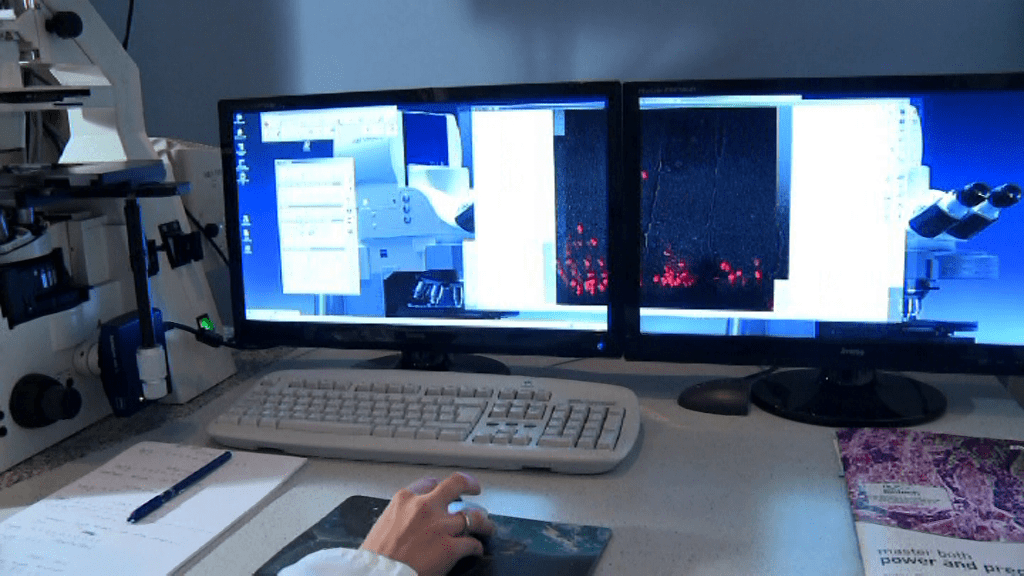
Large Animal Models Laboratory (LAML) of The Kielanowski Institute of Animal Physiology and Nutrition, Polish Academy of Sciences, was established on July 19, 2018, based on existing centres for pigs and ruminants and a veterinary laboratory at the Institute. Thanks to the special-purpose subsidy granted by the Ministry of Science and Higher Education to cover the costs of restructuring the Institute in the years 2018-2019, it was possible to modernize the animal housing and purchase equipment and the necessary scientific and research apparatus.
The Large Animal Models Laboratory is an experimental animal facility, adapted to keep pigs, sheep, and cows and to breed them for scientific or educational purposes. Animals can be kept individually or in groups, depending on the needs of the experiment. Animals kept in the Laboratory are provided with daily care and health checks.
The Laboratory team consists of animal technicians, veterinarians, qualified technical staff, and researchers who have completed appropriate training in accordance with the Act of January 15, 2015, on the protection of animals used for scientific or educational purposes.
LAML HAS A PRESTIGIOUS AAALAC INTERNATIONAL ACCREDITATION
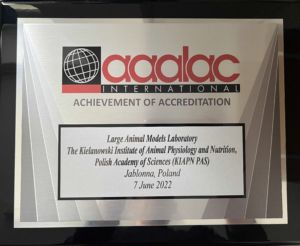
On June 7, 2022, the Association for Assessment and Accreditation of Laboratory Animal Care International Council (AAALAC) granted LAML KIAPN PAS full accreditation of AAALAC International. The AAALAC certificate is awarded to entities conducting animal research with particular care for their welfare and maintaining the highest ethical standards. The Laboratory is the first Polish unit that obtained the AAALAC certificate for conducting research on large animal models.

Large Animal Models Laboratory offers services in the field of:

field of physiology, nutrition, biology, biotechnology, medicine, veterinary medicine, experimental surgery, neurology, orthopaedics, and model research on animals;


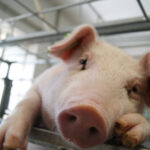
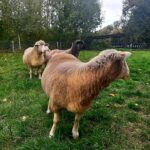
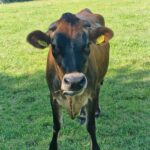
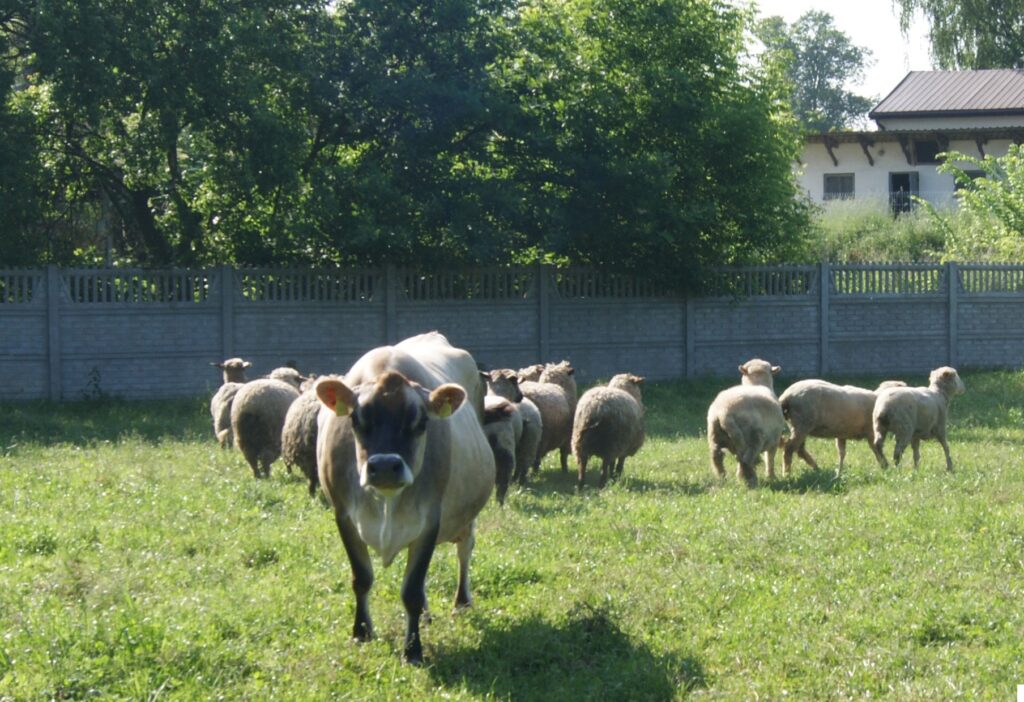
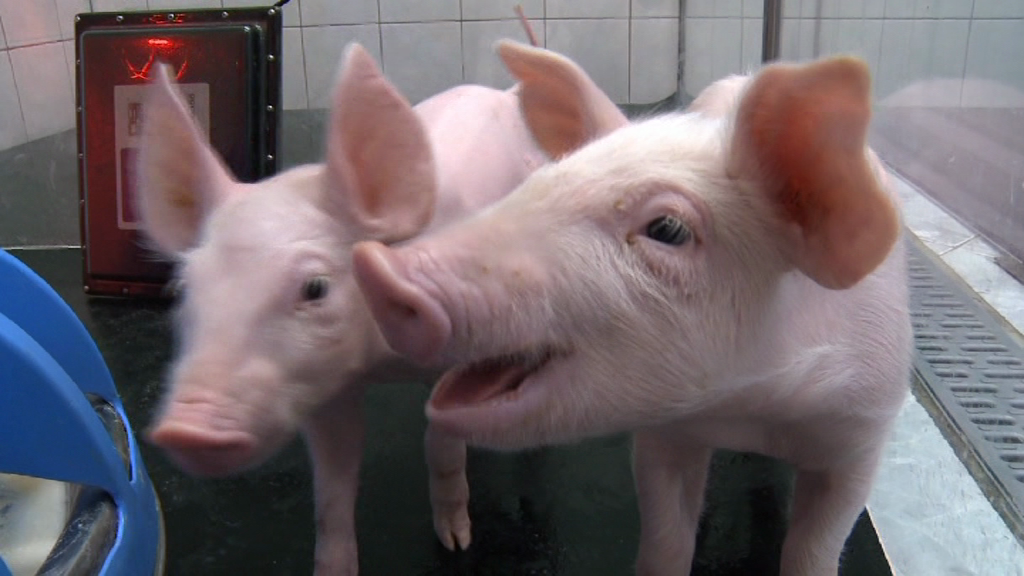
We also provide:
- assistance in planning experiments on pigs, sheeps and cows;
- consultations in the preparation of an application to the Local Ethics Committee for consent to conduct the experiments.
Infrastructure
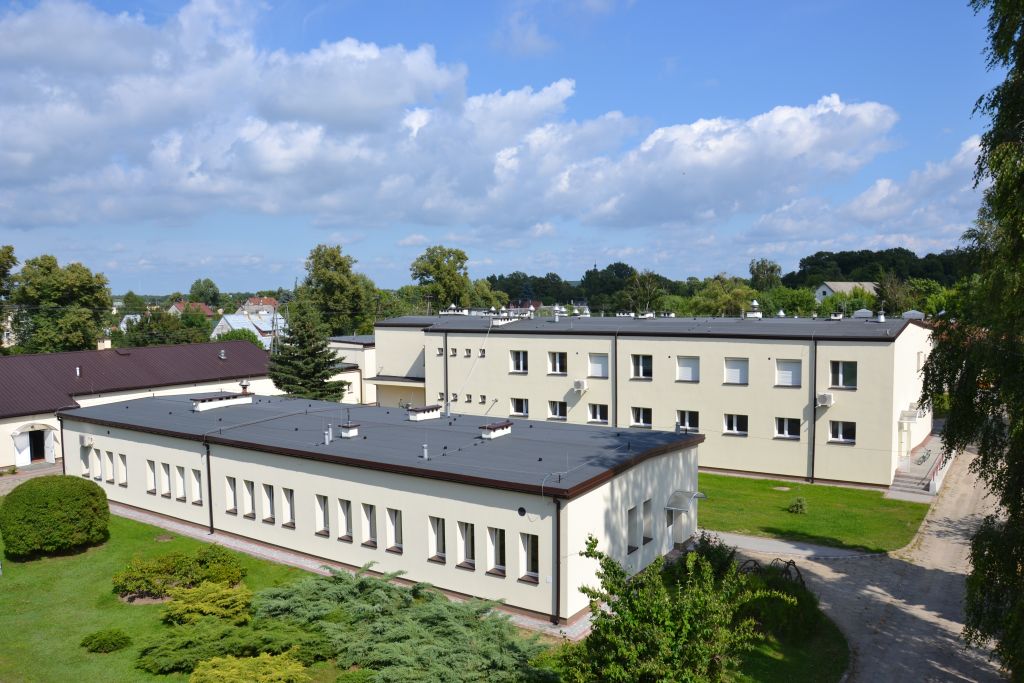
Currently, the LAML consists of two modernly equipped centres for large farm animals: Pigs Centre and Ruminant Centre; as well as a modernly equipped veterinary lab. The Laboratory provides access to animal breeding rooms (a piggery, two balance rooms for pigs, a cowshed and breeding rooms for sheep, and a pasture), operating rooms, diagnostic rooms, and an experimental slaughterhouse.
The most important rooms/equipment
Neonatal research laboratory
It allows keeping, in laboratory conditions, premature and newborn piglets without the presence of the mother. Premature piglets require special, round-the-clock, individual care, especially in terms of feeding. Newborn piglets also require 24/7 care as they are getting accustomed to using an artificial sow, from which they take milk mixture or milk replacer.
Thanks to equipping the laboratory with a ceiling air conditioner, it is possible to maintain the right temperature in the room, and portable air humidifiers ensure adequate room humidity, which is especially important for premature and newborn piglets.
In addition, the system of automatic control of external roller shutters allows researchers to adjust the length of the daylight to the needs of a given experiment.
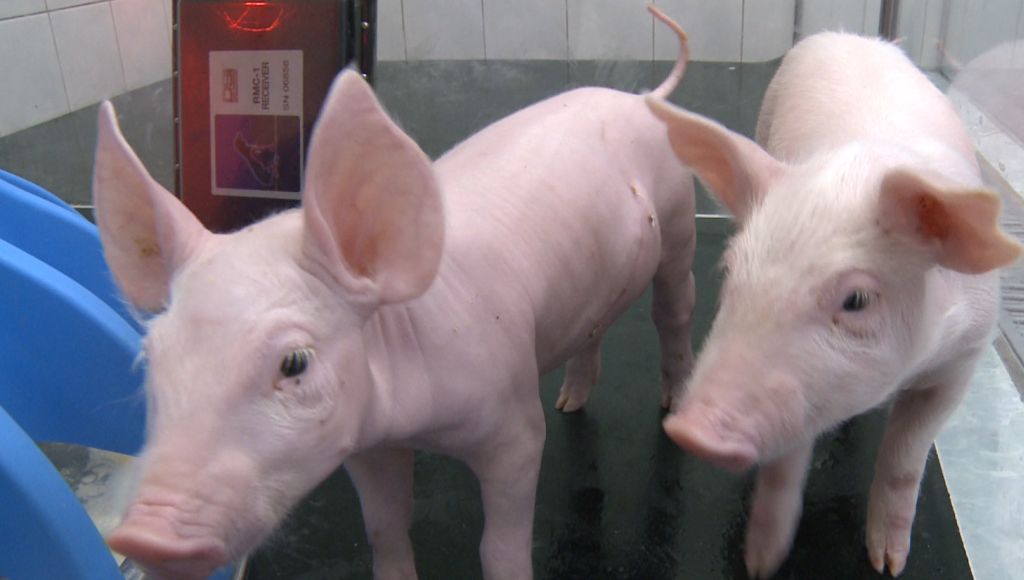
Two balance rooms for weaned piglets
Balance rooms enable the collection of samples for testing as well as the collection of faeces and urine. The rooms are equipped with balance cages for individual animal keeping, ensuring constant access to water, a ventilation and heating system, a ceiling air conditioner, and sensors for recording the microclimate in the room.
Experimental piggery
Piggery is divided into 3 sectors, equipped with pens for the individual pigs with the possibility of transformation into group pens and farrowing pens of the walking type necessary e.g. for Nutritional Growth Programming. Each pen individual pigs is equipped with two drinkers (for weaned piglets and fattening pigs) and an AP-1T automatic feeder. In turn, the farrowing pens of the walking type are divided into a part for the sow equipped with a nipple drinker, an AP-1T automatic feeder, and protection against crushing the piglets when the sow lies down. The part for piglets is equipped witha nipple drinker and an automatic device for feeding piglets. Each pen is equipped with a rubber lair mat and a manure channel secured with a floor grate. Each sector of the pigsty is equipped with a ventilation and heating system and sensors for recording the microclimate which enable automatic control of the intensity of the exhaust chimney, heaters, and the degree of opening of the air inlets.
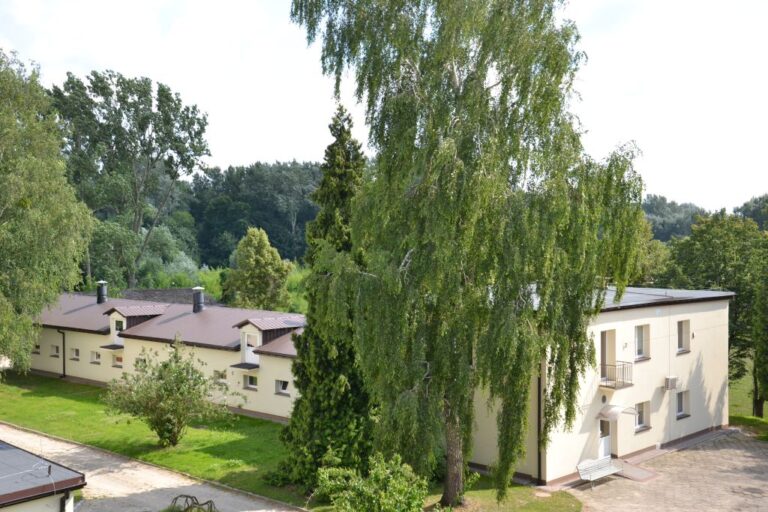
Four sheep rooms
Rooms are quipped with pens for individual or group keeping. Each sheep is provided with a pan, feeder, salt lick, and access to water. The rooms are equipped with ventilation and heating systems as well as sensors for microclimate recording
Sheep room for cannulated sheep and animals after rumen defaunation and partial faunation
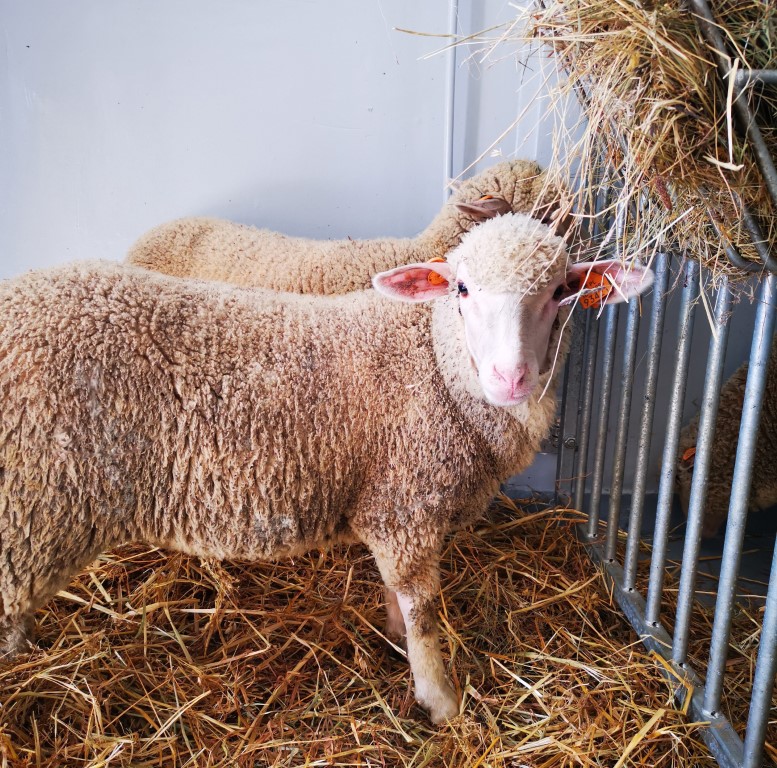
In order to prevent contamination, it is possible to install partitions separating neighbouring animals (while maintaining visual and auditory contact with other sheep). Each animal is provided with a pan, feeder, salt lick, and access to water. It is possible to keep animals on lair mats or floor grids. The room is equipped with a microbiome eradication station, a ventilation, and heating system as well as sensors for microclimate recording.
Two complexes for group keeping of sheep in open conditions
The rooms are equipped with feeders and troughs for group feeding. Animals are provided access to water and salt licks. Straw litter bedding.
Sheep balance room
Room enables the collection of samples for testing and the collection of faeces and urine. The room is equipped with balance cages for the individual animals, external blackout roller blinds to control the length of daylight, ventilation, and heating system, and sensors for recording the microclimate in the room.
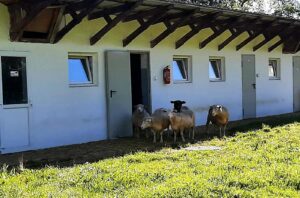
Sheep infusion room
Infusion room enables acquiring samples for testing. In the room, there are cages for the individual animals. The room equipment allows for injections or infusions into the blood and brain structures, collection of cerebrospinal fluid, and perfusion by the push-pull method on living animals.
Two operating theatres
Theatresenable the performance of surgeries on both small and large farm animals.
Veterinary lab
Laboratory is equipped with portable digital X-ray apparatus, a portable ultrasound apparatus with a set of transducers, an anaesthesia machine, a stereo-tactical apparatus for sheep, and an autoclave. In addition, the laboratory is equipped with Mythic 5Vet PRO haematology analyser and FUS-3000 Plus urine analyser.
Densitometric laboratory
Laboratory is quipped with a NORLAND XR-800TM densitometer, which enables the determination of fat content, fat-free mass, and mineral components and their density in the whole body, cuts, and prepared bones. Thanks to the high load capacity, it is possible to perform a densitometry analysis of an animal weighing up to 120 kg. In addition, the studio has a TA-HDi texture analyser used, among others, for the determination of the biomechanical properties of bones.
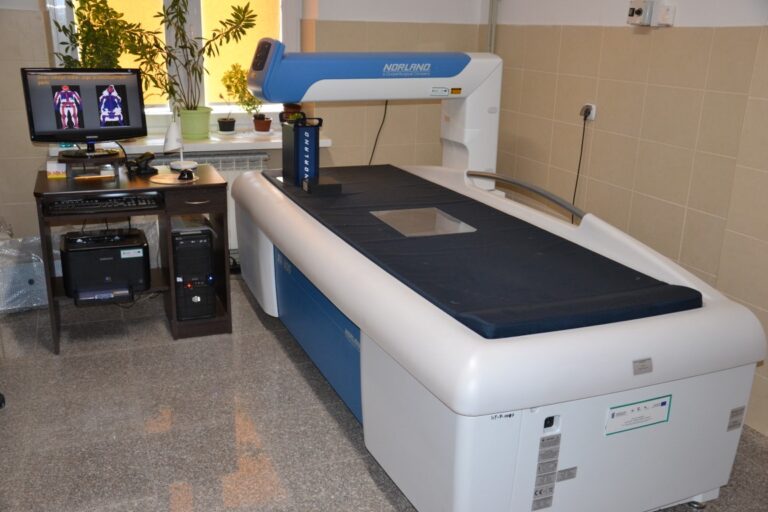
RESEARCH ON LARGE ANIMAL MODELS
In addition to zootechnical experiments, the Laboratory conducts research with the use of large animal models, including:
- Newborn piglets – as a model of premature and newborn babies;
- Weaned piglets and weaners – as models for children, adolescents, and adults;
- Gilts – as a model in fetal analysis and programming, which includes research on the effects of the environment on fetal development;
- Adult pigs – as a model for humans;
- Miniature pigs – as models for children, teenagers, and adults;
- Adult sheep cannulated to selected brain structures – as a model for the study of the human central nervous system;
- Adult sheep cannulated into the jugular vein – as a model for the study of the circulatory and nervous systems;
- Adult sheep – as a model in orthopedic research;
- Sheep cannulated into the rumen – for the study of the physiology of the digestive tract and the assessment of the nutritional value of feed.
In addition, the Laboratory conducts research on defauned and selectively refauned sheep, enabling the determination of the role of individual groups of microorganisms in the digestion of nutrients, as well as on heifers cannulated into the rumen.
PARTNERSHIP
The Large Animal Models Laboratory invites domestic and foreign scientific units and other entities (including the pharmaceutical and biomedical industry and medical facilities) to cooperate in the implementation of research projects, also in terms of conducting preclinical studies.
REGISTER ENTRIES
- The Institute’s identification number in the register of users authorized to use animals for scientific or educational purposes: 0043
- The Institute’s identification number in the register of breeders authorized to breed animals for scientific or educational purposes: 0029
SUPERVISION
The Large Animal Models Laboratory is subordinated to the 2nd Local Ethical Committee for Animal Experiments at the Warsaw University of Life Sciences.
According to Art. 25 of the Act of January 15, 2015, on the protection of animals used for scientific or educational purposes, the Animal Welfare Team supervises the correctness of animal experiments conducted at the Institute, including the LAML
CONTACT
PhD, DSc Jarosław Woliński, Prof. KIAPN PAS
🖂 j.wolinski@ifzz.pl; ✆+48 666 055 013
The Kielanowski Institute of Animal Physiology and Nutrition Polish Academy of Sciences;
Instytucka 3, 05-110 Jabłonna, Poland
